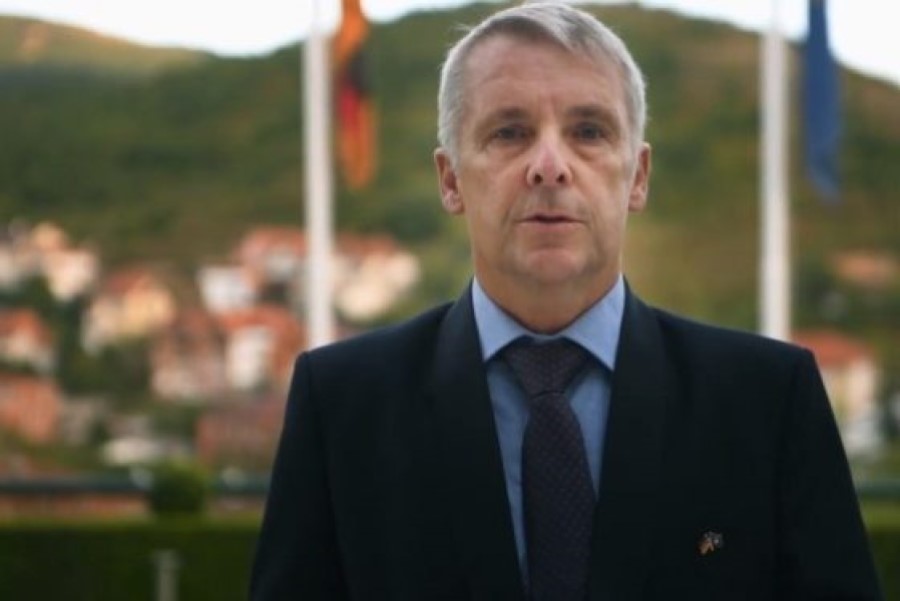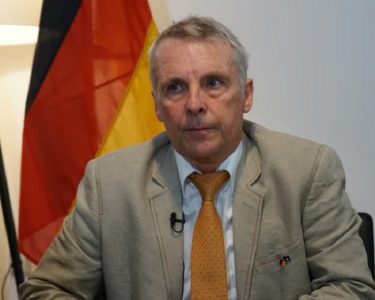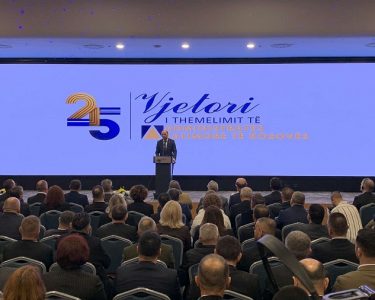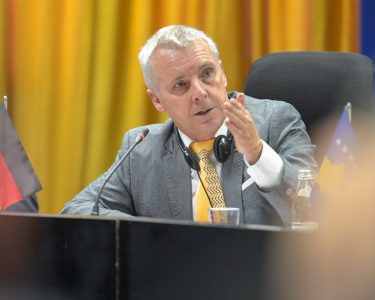German Ambassador to Kosovo Jorn Rohde says it is essential that after February 14th Kosovo has a stable government to work diligently on Kosovo’s development in order to have more good news from Kosovo.
In an exclusive interview for the Independent News Agency Kosovapress, Ambassador Rohde spoke about the electoral process taking place in Kosovo, the necessity of holding free and fair elections, his desire not to have a political crisis after the election epilogue, etc.
He says it is high time the new government began to seriously ‘replace words with deeds’ by fighting corruption and crime in a fundamental way, to improve Kosovo’s image in this regard. In relation to the dialogue with Serbia, the new government needs strong parliamentary support where it needs to invest political capital and political will in this dialogue facilitated by the EU, because it is inconceivable that the EU would accept new member states that do not recognize each other.
Interviewed by: Elsa Kelmendi
KosovaPress: The current political developments in Kosovo have reached their peak, as a result of the political battle for the February-14 elections. What is your viewpoint on these developments?
Ambassador Rohde: Elections times are always ripe with drama and emotions. We as Quint Ambassadors and I myself have on numerous occasions expressed our continued commitment to free, fair, safe, and peaceful elections on February 14. We believe that the people of Kosovo deserve calm and maturity from all sides. We urge everyone to refrain from inflammatory and speculative personal attacks. As they weigh up their choices, the people of Kosovo deserve to hear detailed policy proposals from their politicians, with arguments made in a spirit of informed debate.
KosovaPress: Perhaps it is ‘a first’ for an electoral process in Kosovo to be facing a challenge seemingly uneasy to overcome. That is, the Consitutional Court has decided to prohibit the candidacy of those who possess a criminal record with a final court decision within a three-year period. Meanwhile, the Election Committee remains determined to implement this decision. Thus, this has prompted public resentment and a cry for justice. What are your thoughts on the matter?
Ambassador Rohde: Above all stands the rule of law and the respect for due process. The Central Election Commission must ensure that the electoral process is transparent and free from political interference. It is important that legal decisions are respected, and avenues for appeal are pursued without interference.
KosovaPress: How do you imagine Kosovo past the Feb. 14 election?
Ambassador Rohde: We will soon have the third election and as many gov’ts in a good 3 years. Much needed is a stable government that ideally can govern a full legislative period. The last thing the people of Kosovo need would be yet another election later this year if the parties cannot agree on a president for the country.
KosovaPress: As the representative of Germany to Kosovo, what do you presume is the most important step Kosovo’s soon-to-be leaders must take after the February-14 elections?
Ambassador Rohde: Beyond agreeing on a new president for Kosovo, I see the first priority for the new government in working as efficently as possible to overcome the wide ranging and disastrous economic, financial and social impacts of the pandemic. This is true for all governments in Europe and elsewhere, of course, but it is harder when you are not a rich country. Here, close cooperation between governments, including those of neighbouring countries, is a must. Besides that I see two urgent priorities for Kosovo:
The first is, high time the new Government seriously starts ‘walking the talk’ and sustainably combats corruption and crime: unfortunately the 2020 corruption index published by Transparency International last week reveals a worrying trend for Kosovo and for other Western Balkan countries too. For the 4th year in a row Kosovo was downgraded in the ranking and has now dropped to place 104. This unsatisfactory situation is also highlighted by the recent EU contry report on Kosovo which states: “corruption is widespread and a remains a serious issue of concern. There is a need for strong political will to effectively address corruption issues”. Not taking that EU concern more seriously will undoubtedly impact the process for further EU integration of Kosovo negatively.
The second is, dialogue with Serbia. A new and stable government, supported by strong parliamentary support, needs to invest politicial capital and political will in this EU-facilitated dialogue – as needs to do Serbia – to achieve much needed progress for a comprehensive agreement aimed a full normalization of relations. This in turn will further pave the way towards EU membership since it is not imaginable that the EU accepts new MS that do not recognize each other.
KosovaPress: It is public knowledge that Germany held the EU presidency from June 2020 until December of the same year. At the time when Germany took over, many in Kosovo were outspoken and optimistic that a progress would be made on the Visa liberalisation front for Kosovars. However, nothing happened. Please tell us, was this lack of progress the result of Kosovo’s profound political crisis, or was it rather due to the lack of a consensus within the EU?
Ambassador Rohde: Well, there is a national and an international aspect to this. Internationally, we would have liked to achieve more progress during our Presidency. We have re-introduced the subject into discussions in Brussels, but we are still facing scepticism by some member states. For this reason, we have repeatedly urged the Kosovo Government to engage proactively with those member states which are still sceptical. On the domestic side, the news about continuous political instability coming out of Kosovo are clearly not conducive to resolve this issue; nor is the lack of progress in fighting corruption and improving the rule of law. We will need more good news coming out of Kosovo in 2021.
KosovaPress: Germany is perhaps the country most sought after by Kosovars who wish to live and work abroad. Meanwhile, German authorities often warn us about how imperative it is for Kosovo to have political and economical stability so that the influx of Kosovar asylum seekers in Germany decreases or is eliminated entirely. What is your message on this matter?
Ambassador Rohde: You have answered the question already: the most attractive countries for immigration – whether in the EU or in North America – are economically and politically stable. Most people would not leave their home country unless they do not see a future for themselves or their children at home. Kosovar citizens are still interested in applying for work visas in Germany, although currently – due to the ongoing COVID-19 pandemic – we can only issue visa in a limited number of categories.








